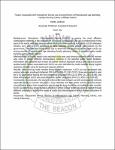| dc.description.abstract | Background: Intrauterine Contraceptive Device (IUCD) is among the most effective
contraceptive methods in the market with increasing use globally. The use is predominant in few
parts of the world, with sub-Saharan Africa relying on other methods. In Uganda, IUCD utilization
remains very low at 1.5% compared to other methods despite several interventions by the
government. The objective of this study was to determine the factors associated with IUCD use
among women of reproductive age attending family planning clinics in selected public health
facilities within Mbale District.
Methodology: A facility based cross-sectional study was used among randomly selected women
who came to obtain different contraceptive methods in the selected public health facilities.
Information was obtained face-to-face by trained research assistants using a pre-coded structured
questionnaire. Factors associated with IUCD use were identified by multi-variable binary logistic
regression models using the backward stepwise method.
Results: After running multi-variable binary logistic regression, IUCD use was associated with
women who were employed (Adjusted OR=14.00, 95% CI;2.80-70.07), those who wanted to wait
for 6-10 years before having the next pregnancy (Adjusted OR=12.19, 95% CI;1.35-110.08), and
those who thought IUCD was associated with cancer (Adjusted OR=0.15, 95% CI;0.03-0.68).
Conclusion: In conclusion, the study re-enforced the need to reach out with contraceptive methods
especially IUCD to women who have a busy schedule and also points out the need for proper
counselling to ensure that women who plan to stay for long should be counselled to also consider
IUCD use which has a longer duration of action. Further, proper health education is needed through
different channels to address the issues of myths and misconceptions which hinders utilization of
IUCD.
Keywords: Intrauterine Device, Women of Reproductive age, Family Planning Clinics, and
Family Planning | en_US |

